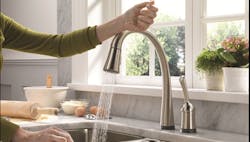Universal Design and Kitchen Appliances
Touch faucets are extremely easy to turn on and off in a hurry. The photo is of a Delta faucet, but every major manufacturer makes both touch and motion-activated faucets, and many offer both in the same fixture and at various prices.
Universal design fixtures and appliances can make a kitchen easier to use, for all ages
Designing a kitchen for lifelong utility comes down to a couple of key focal points: space planning and fixtures/appliances. This article covers the latter and is adapted from a Universal Design Tutorial by Todd Hawkins of BuilderFish in Northern Virginia.
Todd is a self-proclaimed Universal Design Evangelist and boils it down to effortlessness. "Every appliance or fixture we put into a kitchen should cater to effortlessness." Each should promote user-efficiency and ease—to minimize lifting, reaching, stooping, or other off-balance movement he says. "In a nutshell, we aim to keep everything close at hand or easily accessible."
Todd notes that all major appliance brands carry a Universal Design (UD) line, so there is plenty of selection. As a customer resource, he points customers to General Electric's UD Kitchen Design Center "because the page is so well designed with lots of pictures, FAQs, and a tutorial about the Universal Design."
Todd's appliance recipe has four main ingredients.
General univeral design guidance:
- Consider knee space under cook tops, sinks and prep area for seated option.
- Don't forget proper lighting: Ambient, task, and accent are ideal.
- Automatic features, regulators, and lockout mechanisms can make appliances easier to use, improve safety, and add control.
Dishwasher do's and don'ts:
- Raising the dishwasher is a popular way to break up a kitchen and reduce stooping for adults, but it is not necessarily convenient for a person in a chair or kids.
- The dishwasher should be located in space immediately adjacent to the sink.
- Consider two dishwashers (you'll thank me later).
Universal design cooking comments:
- Ensure that appliances have front-mounted controls (to eliminate reaching over burners) with safety LEDs to show the burner is hot or active.
- Avoid raised heating elements on ranges in favor of smooth glass surfaces (for sliding pots instead of lifting).
- Although more expensive and requiring special cookware, consider magnetic induction cook tops to greatly reduce the danger of burns or fire. They also save energy because they don't activate until you place cookware atop burner.
- Install wall ovens to eliminate bending over.
- A faucet over a cooktop is much safer than lugging a pot to and from the sink.
Refrigerator reminders:
- A side-by-side refrigerator/freezer (particularly with gallon-container storage inside the door) is most inclusive.
- Remember the "universal reach range" of 15 inches to 54 inches when selecting.
Bottom line i=on universal design: who wants to spend time lugging pots, pans and cleaning a kitchen? Not me, and probably not your customers. If your customers are going to splurge, make their kitchen not just beautiful, but convenient, safe, and adaptable for growth. After all, the kitchen is where life revolves.
Adapted from a 24-part series on Universal Design by Todd Hawkins, president of BuilderFish in Northern Virginia.
Ed's note: we deeply regret the overuse of alliteration in the subheads. Mr Hawkins had nothing to do with it; we simply could not help ourselves. And when we say "we," we mean "me."—DM

